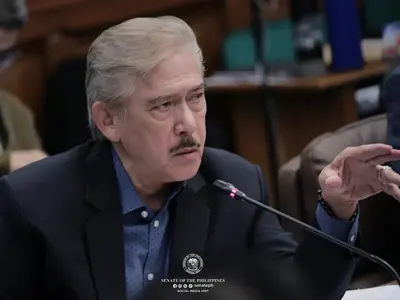
Speaker Ferdinand Martin G. Romualdez (right) discussed with California Representative Darrell Issa (left) his appeal for enhanced military assistance from the United States. Also in the photo is Virginia Rep. Robert “Bobby” C. Scott.
THE extensive lobbying efforts of the Philippine delegation, led by Speaker Ferdinand Martin G. Romualdez, paid off as the United States House of Representatives approved an $8.1 billion emergency aid package for key allies in the Indo-Pacific, including the Philippines.
Speaker Romualdez conveyed his appreciation to the U.S. House for the bipartisan support of the groundbreaking measure, crucially beneficial for Filipinos amid escalating tensions in the West Philippine Sea.
“This is a momentous occasion that underscores the enduring partnership between our nations and the unwavering commitment of the U.S. to fostering stability and prosperity in the Indo-Pacific,” Speaker Romualdez declared.
“We are deeply grateful for the bipartisan effort that has led to the approval of this crucial assistance, which will undoubtedly strengthen the security and resilience of our region,” he added.
Voting 385-34, the U.S. House passed the $8.1-billion bill, allocating nearly $4 billion in security assistance to Taiwan, the Philippines, and other Indo-Pacific allies, alongside $1.9 billion to replenish U.S. stocks that have been depleted to aid Asian allies, and $3.3 billion for submarine infrastructure and additional provisions.
During the debate, one amendment was adopted to express support for ensuring that security assistance in the bill reaches the Philippines.
Speaker Romualdez expressed his gratitude to Rep. Darrell Issa (R-Calif.) who introduced the amendment to the bill, encouraging the US State Department to allocate $500 million in Foreign Military Financing to the Philippines.
“The passage of this amendment underscores the deepening partnership between our nations and highlights the United States’ commitment to enhancing the defense capabilities of the Philippines,” remarked Speaker Romualdez, leader of the 300-plus-strong House of Representatives on Issa’s help whom he met during his visit.
“I extend my heartfelt gratitude to Rep. Darrell Issa for his steadfast dedication to advancing our shared interests and for his pivotal role in advocating for this significant allocation of military aid to the Philippines,” he added.
The approval of this bipartisan measure comes on the heels of extensive deliberations between the Philippine House delegation, led by Speaker Romualdez, and a number of American legislators at Capitol Hill in Washington, D.C.
These deliberations coincided with the momentous trilateral summit among U.S. President Joe Biden, Japan Prime Minister Fumio Kishida, and Philippine President Ferdinand “Bongbong” R. Marcos Jr.
“The constructive dialogue and shared vision exhibited during our meetings exemplify the enduring partnership between our nations,” Speaker Romualdez said.
He continued, “This aid package symbolizes our collective resolve to fortify the bonds of friendship and cooperation in the Indo-Pacific.”
The $8.1-billion assistance to the Indo-Pacific is integral to the $95.3-billion emergency aid package, which includes vital support for key U.S. allies like Ukraine and Israel. This comprehensive measure will now proceed to the Senate for a final vote.
Speaker Romualdez commended the U.S. House for its “steadfast commitment to advancing global stability and security.”
“The bipartisan consensus underscores the paramount importance of standing united in addressing shared challenges and advancing common objectives,” he stressed.
The Philippine delegation’s engagement with American legislators was marked by camaraderie and cultural exchange, exemplified by the “balut diplomacy” with California 6th District Rep. Ami Bera.
Speaker Romualdez expressed his appreciation for the warm hospitality extended during these interactions, emphasizing the significance of personal connections in fostering enduring partnerships.
He also said that the aid package, encompassing provisions for key U.S. allies across diverse regions, reflects a comprehensive approach to addressing evolving geopolitical dynamics.



